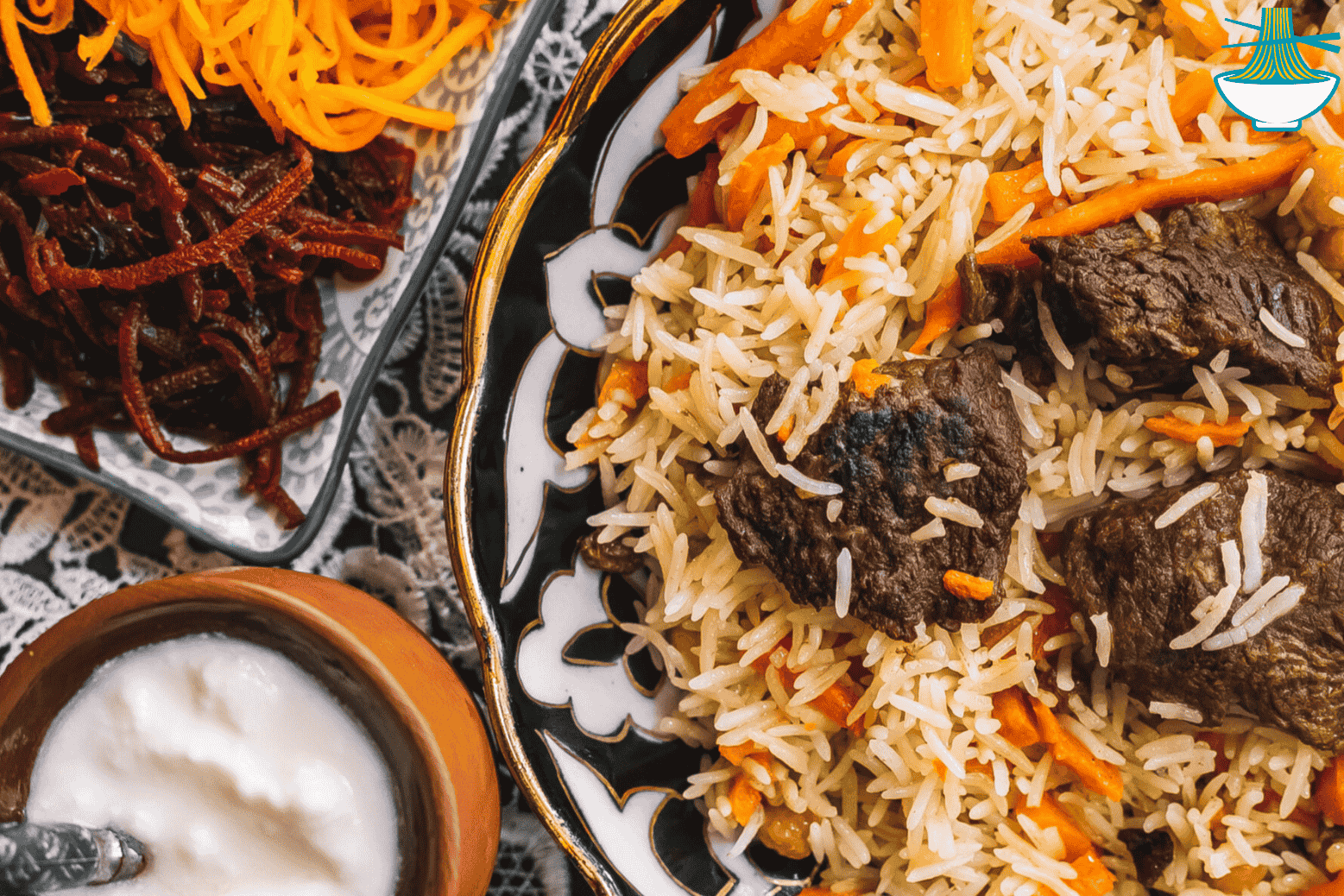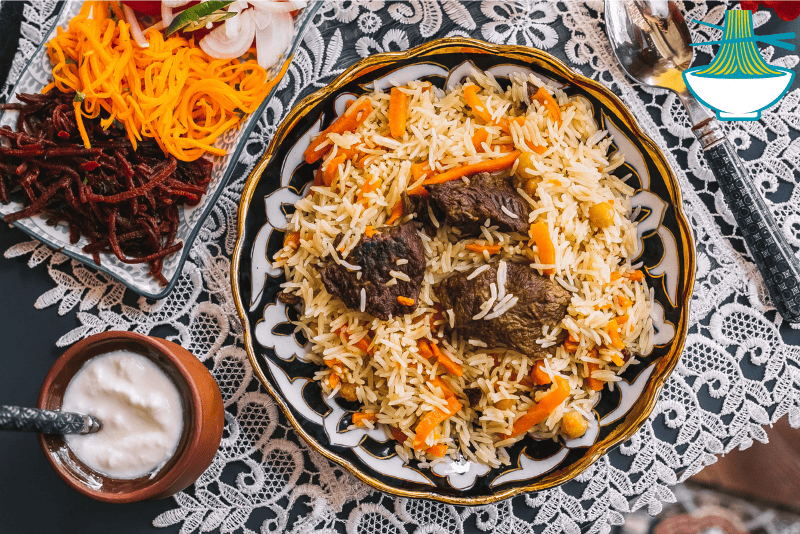"Eid al-Adha Biryani" is a meat-based rice dish enjoyed during the Islamic festival of Eid al-Adha. Biryani has its origins in the Mughal era of the Indian subcontinent, but the specific combination of fragrant rice with savory chicken, mutton, or beef does not have a specific origin or recipe. It is prepared using the sacrificial meat from the festival and varies in flavor and preparation based on regional and personal preferences.

Ingredients:
- 2 cups basmati rice
- 500 grams chicken/mutton/beef, cut into pieces
- 2 onions, thinly sliced
- 2 tomatoes, chopped
- 2 tablespoons ginger-garlic paste
- 1 cup plain yogurt
- 2 teaspoons Biryani masala powder
- 1 teaspoon red chili powder
- 1/2 teaspoon turmeric powder
- 1 teaspoon garam masala powder
- A handful of fresh mint leaves, chopped
- A handful of fresh coriander leaves, chopped
- 4 cups water
- 4 tablespoons ghee or vegetable oil
- Salt to taste
- Saffron strands (optional)
- 1/4 cup warm milk (optional)
For the Eid al-Adha twist, you can also add the following ingredients:
- 1 cup cooked meat from the sacrificed animal (chicken/mutton/beef)
- 1 cup meat stock/broth from the cooked meat
Instructions:
1. Rinse the basmati rice under cold water until the water runs clear. Soak the rice in water for 30 minutes, then drain.
2. Heat ghee or vegetable oil in a large pan or pot. Add the sliced onions and cook until they turn golden brown. Remove half of the fried onions and set them aside for garnishing.
3. In the same pan, add the ginger-garlic paste and cook for a minute until fragrant. Add the chopped tomatoes and cook until they turn soft and mushy.
4. Add the chicken/mutton/beef pieces to the pan and cook until they are browned on all sides. If using cooked meat from Eid al-Adha, add it along with the raw meat.
5. Add the yogurt, Biryani masala powder, red chili powder, turmeric powder, and salt. Mix well to coat the meat with the spices. Cook for a few minutes until the meat is partially cooked.
6. Add the mint leaves, coriander leaves, and meat stock/broth (if using). Cover the pan and let it simmer for 15-20 minutes until the meat is tender and cooked through.
7. Meanwhile, bring 4 cups of water to a boil in a separate pot. Add salt to taste. Once the water comes to a boil, add the soaked and drained basmati rice. Cook the rice until it is 70-80% cooked (still slightly firm to the touch). Drain the rice and set it aside.
8. Preheat the oven to 180°C (350°F). If using saffron strands, soak them in warm milk for a few minutes.
9. In a large oven-proof dish, spread a layer of partially cooked rice at the bottom. Top it with a layer of the cooked meat and gravy. Repeat the layers until all the rice and meat are used, finishing with a layer of rice on top.
10. Drizzle the saffron-infused milk (if using) over the top layer of rice. You can also sprinkle some fried onions and ghee on top for added flavor.
11. Cover the dish tightly with aluminum foil and place it in the preheated oven. Bake for 30-40 minutes until the flavors meld together and the rice is fully cooked.
12. Remove the dish from the oven and let it rest for 5-10 minutes. Gently fluff the rice with a fork before serving. Garnish with the reserved fried onions.
13. Serve the Biryani hot with raita (yogurt dip) or any other side dishes
of your choice.

Nutrition Value:
1. 2 cups basmati rice
- Calories: 400
- Carbohydrates: 88 grams
- Protein: 8 grams
- Fat: 0.5 grams
- Sodium: 0 milligrams
- Cholesterol: 0 milligrams
- Vitamins: Minimal amounts of B vitamins
- Minerals: 1.2 milligrams of iron, 23 milligrams of magnesium
- Nutritional Benefit: Provides a high amount of carbohydrates for energy, and small amounts of protein and minerals.
2. 500 grams chicken/mutton/beef, cut into pieces
- Calories: 1000 (for chicken), 1200 (for mutton), 1300 (for beef)
- Carbohydrates: 0 grams
- Protein: 100 grams
- Fat: 70 grams (for chicken), 80 grams (for mutton), 90 grams (for beef)
- Sodium: 100 milligrams
- Cholesterol: 300 milligrams
- Vitamins: Good source of B vitamins (especially B6 and B12)
- Minerals: High in iron, zinc, and phosphorus
- Nutritional Benefit: Excellent source of high-quality protein and essential vitamins and minerals.
3. 2 onions, thinly sliced
- Calories: 80
- Carbohydrates: 18 grams
- Protein: 2 grams
- Fat: 0.2 grams
- Sodium: 4 milligrams
- Cholesterol: 0 milligrams
- Vitamins: High in vitamin C
- Minerals: Contains potassium and manganese
- Nutritional Benefit: Provides antioxidants and anti-inflammatory compounds, enhances flavor.
4. 2 tomatoes, chopped
- Calories: 40
- Carbohydrates: 10 grams
- Protein: 2 grams
- Fat: 0.5 grams
- Sodium: 10 milligrams
- Cholesterol: 0 milligrams
- Vitamins: High in vitamin C and vitamin A
- Minerals: Contains potassium and folate
- Nutritional Benefit: Rich in antioxidants such as lycopene and vitamins that support immune function.
5. 2 tablespoons ginger-garlic paste
- Calories: 30
- Carbohydrates: 7 grams
- Protein: 1 gram
- Fat: 0 grams
- Sodium: 5 milligrams
- Cholesterol: 0 milligrams
- Vitamins: Contains small amounts of vitamins B6 and C
- Minerals: Contains manganese and calcium
- Nutritional Benefit: Provides anti-inflammatory and antimicrobial properties.
6. 1 cup plain yogurt
- Calories: 150
- Carbohydrates: 12 grams
- Protein: 8 grams
- Fat: 8 grams
- Sodium: 150 milligrams
- Cholesterol: 30 milligrams
- Vitamins: Good source of vitamin B12 and riboflavin
- Minerals: High in calcium and phosphorus
- Nutritional Benefit: Supports digestive health and provides protein and calcium.
7. 2 teaspoons Biryani masala powder
- Calories: 20
- Carbohydrates: 4 grams
- Protein: 1 gram
- Fat: 1 gram
- Sodium: 10 milligrams
- Cholesterol: 0 milligrams
- Vitamins: Contains small amounts of various vitamins depending on spices used
- Minerals: Contains iron, calcium, and potassium
- Nutritional Benefit: Adds flavor and contains antioxidants from various spices.
8. 1 teaspoon red chili powder
- Calories: 6
- Carbohydrates: 1 gram
- Protein: 0.5 grams
- Fat: 0.3 grams
- Sodium: 2 milligrams
- Cholesterol: 0 milligrams
- Vitamins: Good source of vitamin A and C
- Minerals: Contains iron and potassium
- Nutritional Benefit: Adds heat and flavor, and provides antioxidants.
9. 1/2 teaspoon turmeric powder
- Calories: 4
- Carbohydrates: 1 gram
- Protein: 0.2 grams
- Fat: 0.1 grams
- Sodium: 1 milligram
- Cholesterol: 0 milligrams
- Vitamins: Contains small amounts of vitamin C
- Minerals: Contains iron and manganese
- Nutritional Benefit: Known for its anti-inflammatory and antioxidant properties.
10. 1 teaspoon garam masala powder
- Calories: 8
- Carbohydrates: 1.5 grams
- Protein: 0.4 grams
- Fat: 0.4 grams
- Sodium: 3 milligrams
- Cholesterol: 0 milligrams
- Vitamins: Contains small amounts of various vitamins
- Minerals: Contains iron, calcium, and potassium
- Nutritional Benefit: Adds depth of flavor and provides antioxidants.
11. A handful of fresh mint leaves, chopped
- Calories: 5
- Carbohydrates: 1 gram
- Protein: 0.2 grams
- Fat: 0 grams
- Sodium: 1 milligram
- Cholesterol: 0 milligrams
- Vitamins: Contains vitamin A and C
- Minerals: Contains iron and manganese
- Nutritional Benefit: Adds flavor and aids in digestion.
12. A handful of fresh coriander leaves, chopped
- Calories: 5
- Carbohydrates: 1 gram
- Protein: 0.5 grams
- Fat: 0 grams
- Sodium: 1 milligram
- Cholesterol: 0 milligrams
- Vitamins: Rich in vitamin C and vitamin K
- Minerals: Contains potassium and calcium
- Nutritional Benefit: Provides antioxidants and supports digestive health.
13. 4 cups water
- Calories: 0
- Carbohydrates: 0 grams
- Protein: 0 grams
- Fat: 0 grams
- Sodium: 0 milligrams
- Cholesterol: 0 milligrams
- Vitamins: None
- Minerals: None
- Nutritional Benefit: Essential for hydration and helps in cooking.
14. 4 tablespoons ghee or vegetable oil
- Calories: 460 (for ghee), 360 (for vegetable oil)
- Carbohydrates: 0 grams
- Protein: 0 grams
- Fat: 52 grams (for ghee), 40 grams (for vegetable oil)
- Sodium: 0 milligrams
- Cholesterol: 20 milligrams (for ghee)
- Vitamins: Ghee contains vitamin A
- Minerals: Contains calcium (for ghee)
- Nutritional Benefit: Provides energy and enhances flavor. Ghee also has potential health benefits from healthy fats.
15. Salt to taste
- Calories: 0
- Carbohydrates: 0 grams
- Protein: 0 grams
- Fat: 0 grams
- Sodium: Variable
- Cholesterol: 0 milligrams
- Vitamins: None
- Minerals: Contains sodium
- Nutritional Benefit: Enhances flavor; important for electrolyte balance when used in moderation.
16. Saffron strands (optional)
- Calories: 6
- Carbohydrates: 1 gram
- Protein: 0.1 grams
- Fat: 0 grams
- Sodium: 0 milligrams
- Cholesterol: 0 milligrams
- Vitamins: Contains vitamin C and B vitamins
- Minerals: Contains potassium, calcium, and iron
- Nutritional Benefit: Adds flavor and color, and contains antioxidants.
17. 1/4 cup warm milk (optional)
- Calories: 30
- Carbohydrates: 2.5 grams
- Protein: 1.5 grams
- Fat: 1.5 grams
- Sodium: 25 milligrams
- Cholesterol: 10 milligrams
- Vitamins: Contains vitamin D and vitamin B12
- Minerals: Contains calcium and potassium
- Nutritional Benefit: Provides additional nutrients like calcium and vitamin D.


Comments